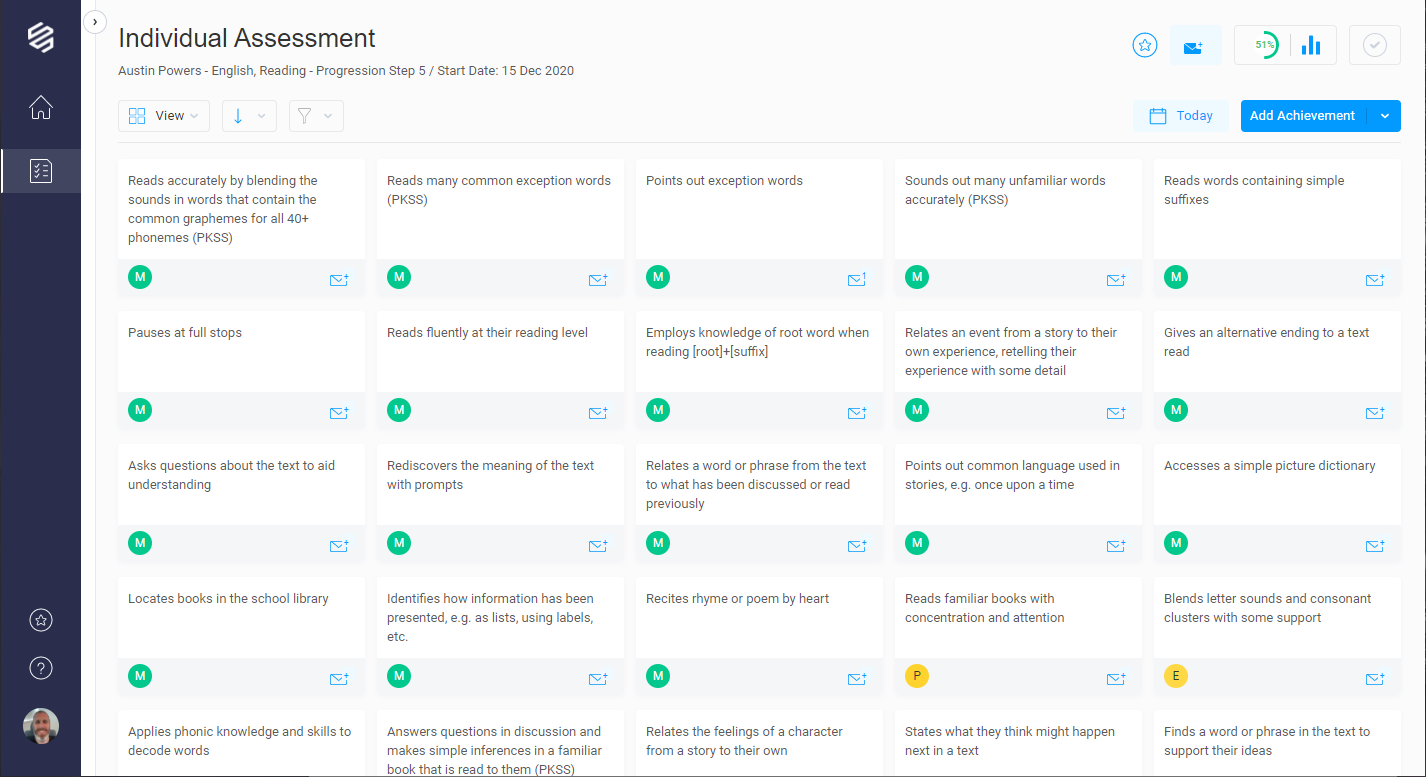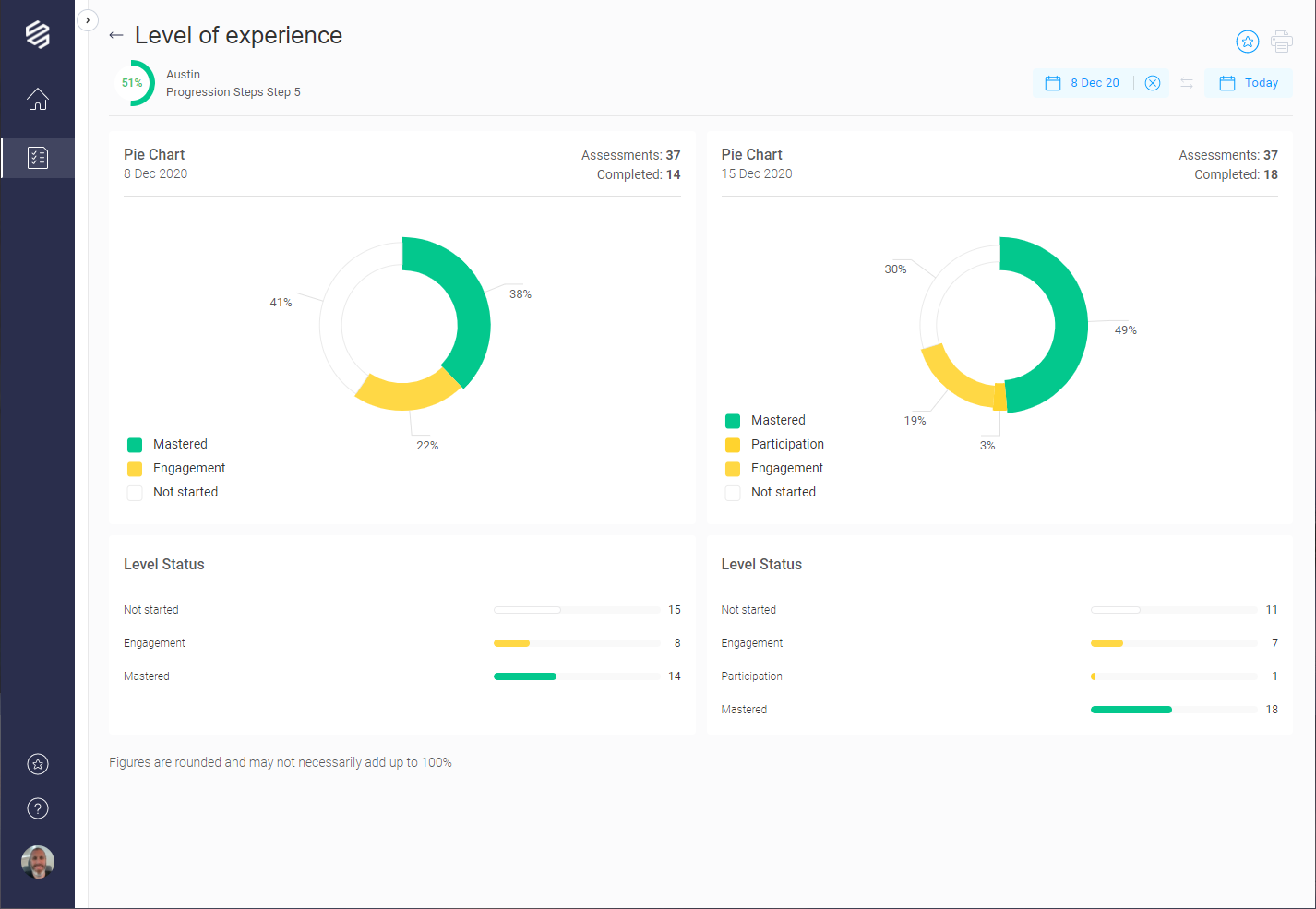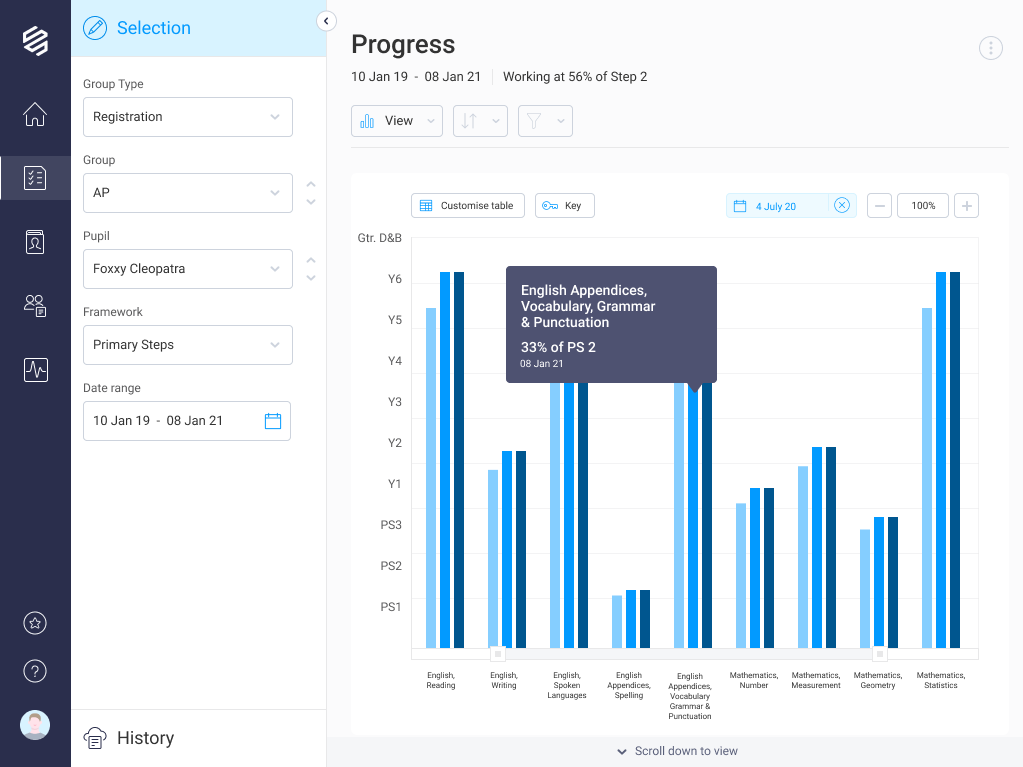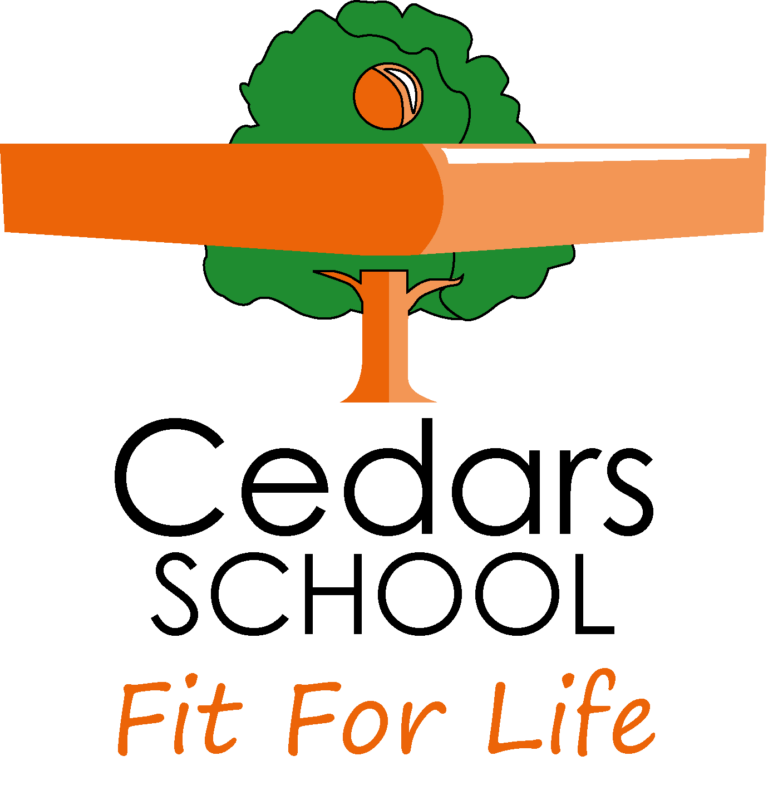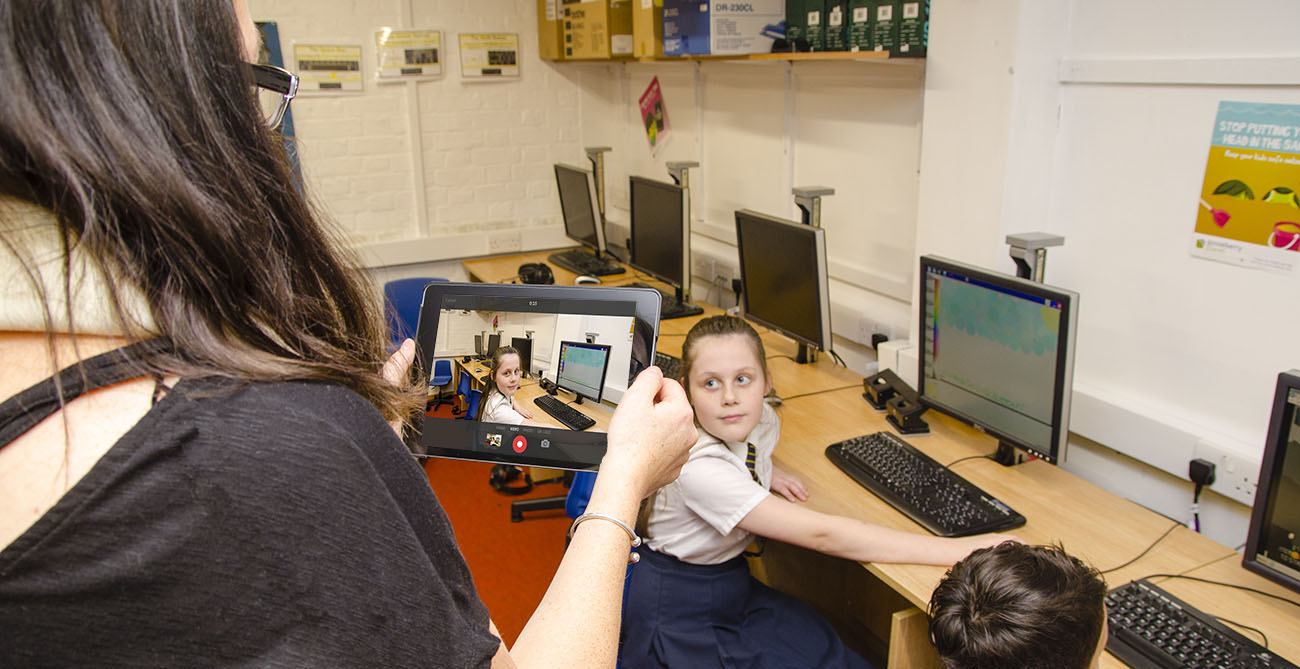Pupil Tracking Software for Primary Schools.
Show Progress for Pupils with SEND
Primary Schools can rely on our software to clearly and concisely track progress of their pupils.
Our assessment software, updated in 2018 inline with the new Pre-Key Stage Standards
A large number of schools struggle to show progress for pupils with SEND. We are widely recommended as a way to support schools to show the small steps of progress pupils with SEND make. We are typically used with pupils working a year behind or more, where their current tracker struggles to show progress.
Over the next 12 months, we are developing our software and our content so that our software can be used with all pupils in primary schools. This will simplify the assessment process, remove the need for two assessment systems and save schools money and time.
Connecting Steps
Connecting Steps is the most popular and effective assessment software for pupils with SEND. A wide range of frameworks that are built into Connecting Steps helps schools get up and running as quickly as possible.
Connecting Steps is the standard asssessment system for pupils with SEND across a number of authorities in the UK. The simple interface, powerful features and flexible approach to progress means it works for a wide range of pupils. Connecting Steps V5 brings even more features and now works on iPads and other tablet devices.
Great Feedback
We can now demonstrate all student progress, however small
“We see B Squared’s Connecting Steps as a valuable part of our comprehensive assessment programme. We can now demonstrate all student progress, however small. It has also helped us to be secure in our judgements and improve learning outcomes as a result.”
Michelle O’Reilly, Head of School – Cedars School
Unifying our school’s assessment approach
“B Squared has played an important role in our school in terms of unifying our school’s assessment approach, reducing workload, and clarifying how we measure steps of progress made by our pupils.” Joanne Watson, Assistant Head Teacher – Bluebell Park School.
Want to find out how connecting steps simplifies assessment?
Click on the button to arrange a FREE online meeting to find out how we can help make assessment easier for your school
Assessment for ALL pupils in Primary Schools
To reduce workload and costs for schools, we are developing Connecting Steps to work for all pupils. We have created 2 new frameworks (Development Matters and Primary Curriculum) to allow Connecting Steps to be used in mainstream primary schools for all pupils. Our 4 frameworks for primary schools are:
- Development Matters – for typically developing students working within the Early Years Foundation Stage.
- Early Steps – for students working within the Early Years Foundation Stage with SEND.
- Primary Curriculum – for students following the Primary National Curriculum working at age-related expectations (ARE).
- Primary Steps – for students following the Primary National Curriculum with SEND working below age-related expectations.
Our new Analytics Platform allows schools to combine the data for SEN and non-SEN pupils into a single data set automatically.
New Assessment Frameworks
There have been a number of changes around assessment over the last few years, with the removal of P Levels and the introduction of the pre-key stage standards and the Engagement Model. Our frameworks are inline with the latest government guidance.
Early Steps 2021
Our Early Steps assessment framework was updated in 2020 inline with the Early Years Foundation Stage 2021 and the new Development Matters 2020. We have made a number of changes to support pupils with SEND.
Engagement Steps
Our Engagement Steps has been designed to support ‘The Engagement Model’. It has been created for pupils working below the pre-key stage standards, who aren’t engaged in subject specific learning.
Primary Steps
Primary Steps has been designed to support pupils in primary schools that are either working below Year 1 or out of their year group. This framework supports the new pre-key stage standards. It supports teachers to show progress and identify next steps.
Evisense
Evisense is a powerful evidence for learning system. The social media style interface for staff and parents is simple to use, but extremely powerful. Our apps for iPhone, iPad, android (tablet and phone) and Kindle Fire means whatever device you are using, you can use the Evisense app.
A number of features make Evisense the most secure evidence for learning system. A number of controls ensure data is safe and evidence can only be accessed by the right people. If you use Evisense and Connecting Steps together, you can link evidence to the skills in Connecting Steps. You can then view the evidence from within Connecting Steps.
Want to find out EVISENSE CAN HELP SHOW PROGRESS?
Click on the button to arrange a FREE online meeting to find out how Evisense can help show progress for puils with SEND
Holistic Assessment
We have 15 assessment packages available across 7 different frameworks. Schools can choose packages based on their needs. We have a range of packages and frameworks for Cognition and Learning covering a wide range of ability, for different age ranges. We also have frameworks to suit the other areas of need – Communication & Interaction, Social, Emotional and Mental Health (SEMH) and Sensory and Physical. Our Autism Progress is a tool to help schools profile how a pupil’s autism impacts them and their learning. The image below gives you an overview of our different frameworks.
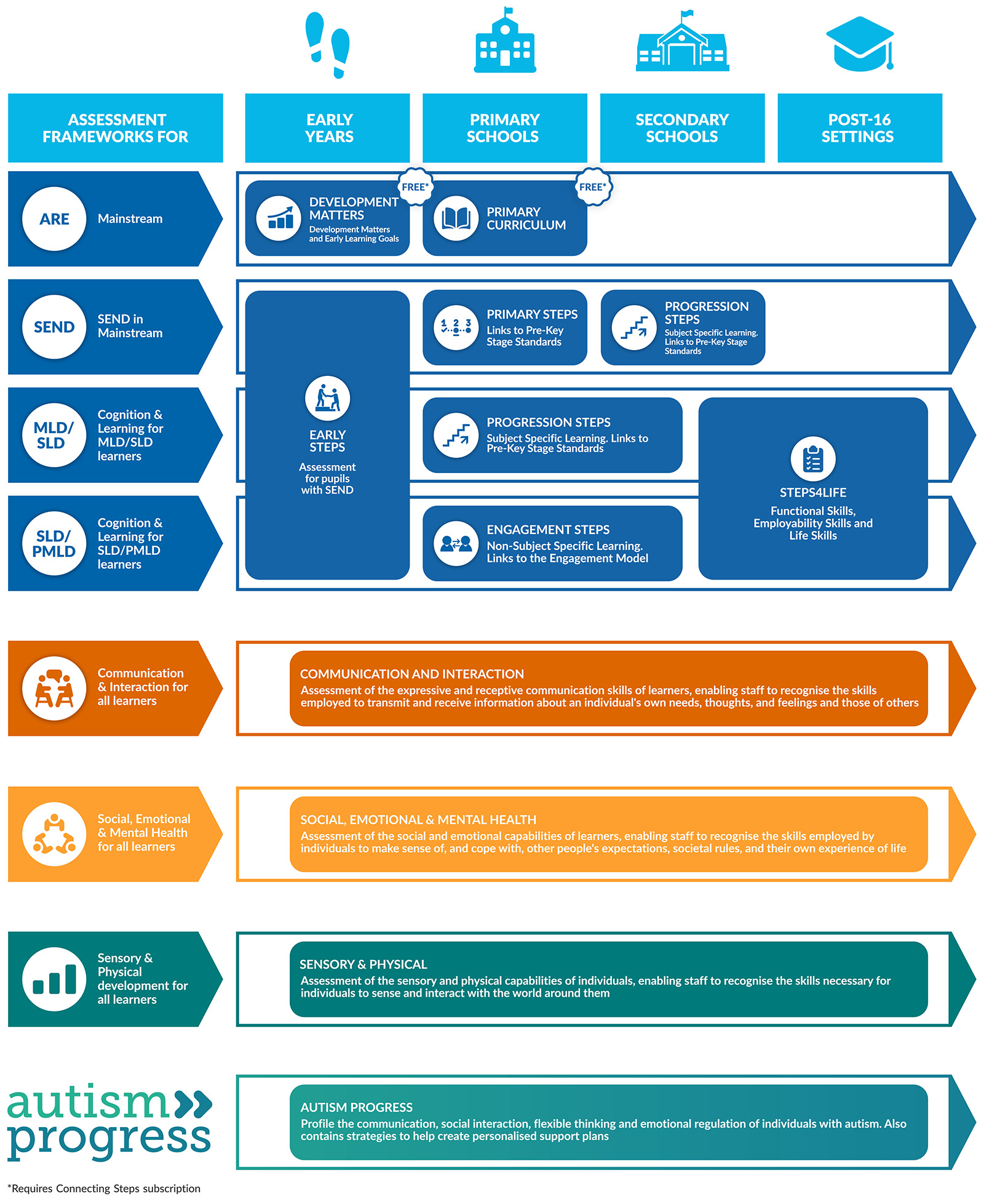
Comparing Frameworks
Each framework has its own levelling system, often based on government guidance. The button on the left shows you the ability range of each of our frameworks suitable for primary settings and how they compare. Any skill that appears in multiple frameworks are linked, this simplifies transitioning between frameworks.
Early Steps
Early Steps is for pupils working within the Early Years Foundation Stage (EYFS). Our updated Early Steps reflects the changes introduced by the new EYFS 2021 Framework and the new 2020 Development Matters. Early Steps covers a developmental range equivalent to Birth to ELG.
Our NEW updated Early Years Foundation Stage (EYFS) assessment covers the range from birth to the Early Learning Goals (ELG) and beyond. We have used the new EYFS 2021 Framework and the new 2020 Development Matters when developing this framework.
The leveling structure of the new Development Matters document is different to previous frameworks and wasn’t designed with SEND in mind. The lowest level in the new Development Matters is birth to 3 Years. We have taken the decision to split Birth to 3 Years into 8 levels, so that settings with pupils with SEND can show progress for these children and help profile their needs.
Engagement Steps
Engagement Steps is for pupils not yet engaged in subject specific learning. It supports ‘The Engagement Model’ released in 2020. Engagement Steps covers a developmental range equivalent to P1(i) to P6.
‘The Engagement Model’ final guiidance was released in 2020. On page 8 it states that schools have the freedom to decide how to use the engagement model alongside their existing planning, assessment and recording systems. We created Engagement Steps to help schools solve this problem.
Engagement Steps uses the 5 Aspects of Engagement from the Engagement Model, within Cognition and Learning:
- Exploration
- Realisation
- Anticipation
- Persistence
- Initiation
For more information on using Engagement Steps with the The Engagement Model, click here.
Primary Steps
Primary Steps is for pupils in primary schools, working below Age Related Expectations (ARE). Schools typically use Primary Steps with any pupil working 2 years or more below ARE. The Primary Steps incorporates the Pre-Key Stage Standards. Primary Steps covers a developmental range equivalent to P4 to Year 6
Primary Steps is designed for pupils in primary settings working outside of their year group or below Year 1. Our Primary assessment breakdown containts end of year outcomes taken directly from the 2014 National Curriculum. We have broken these down into smaller steps so that teachers can show progress and identify next steps.Primary Steps includes the first 3 Progression Steps levels for pupils working below Year 1. These Progression Steps link to the pre-key stage standards, simplifying the assessment process.
Primary Steps assessment content is available in 3 packs and covers the following areas:
Core Pack
English
Maths
Science
Plus Pack
Computing
PSHE (Includes Relationship Education)
PE
Foundation Pack
Art & Design
Design & Technology
Geography
History
Languages
Music
Religious Education
Preparing for Adulthood
All children with SEND should be supported in prepearation for adulthood. Our Preparing for Adulthood(PFA) framework supports schools to do this.
The Progression Steps level structure was created by B Squared, but fits in with expectations set by the DfE.
The Preparing for Adulthood (PFA) is our latest pack. It is designed to be used up to Year 9 to help pupils prepare for life beyond education.
Preparing for Adulthood (PFA)
Employment
Independant Living
Community Inclusion
Health
New Preparing for Adulthood framework an absolute game changer
“Connecting Steps has become the best tool for tracking and reporting the progress of our students. Students arrive on different levels, and we can baseline, and target set appropriately for each individual. The new Preparing for Adulthood framework has been an absolute game changer for monitoring progress and sharing next steps.
A fantastic tool!”
Demelza Stocker, Director of Learning – Cape Cornwall School
Want an easy way to show pupil progress?
Click on the button to arrange a FREE online meeting to find out how we can help make assessment easier for your school
Autism Progress
Autism Progress is based on SCERTS. It is designed to be used alongside your academic assessment to help profile a pupils autism. Autism Progress covers a neurotypical developmental range equivalent to P1(i) to NC Level 6
Autism Progress was developed with Scottish Autism, Autism Wessex and North East Autism Society. Autism Progress is a tool schools can use to help profile a pupils autism and how it impacts them and their learning. Autism Progerss has a range of skills spread over a set of progressive levels in the following areas of autism:
- Communication
- Flexibility of Thought
- Social Interaction
- Emotional Regulation
Each area goes from level 1 (around birth) to level 17 (early adulthood). A significant benefit of Autism Progress are the strategies developed to support development. We have worked with experts to create a list of strategies for each area and each level to help support your students.
For more information on using Autism Progress to profile a pupil’s autism, click here


